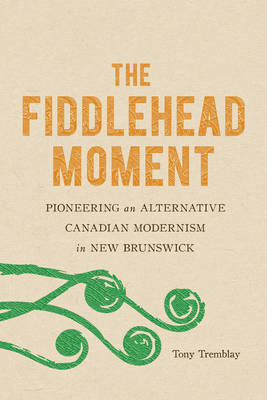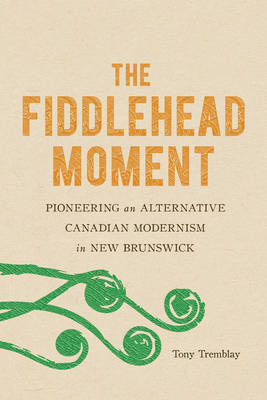
Bedankt voor het vertrouwen het afgelopen jaar! Om jou te bedanken bieden we GRATIS verzending (in België) aan op alles gedurende de hele maand januari.
- Afhalen na 1 uur in een winkel met voorraad
- In januari gratis thuislevering in België
- Ruim aanbod met 7 miljoen producten
Bedankt voor het vertrouwen het afgelopen jaar! Om jou te bedanken bieden we GRATIS verzending (in België) aan op alles gedurende de hele maand januari.
- Afhalen na 1 uur in een winkel met voorraad
- In januari gratis thuislevering in België
- Ruim aanbod met 7 miljoen producten
Zoeken
The Fiddlehead Moment
Pioneering an Alternative Canadian Modernism in New Brunswick
Tony Tremblay
Hardcover | Engels
€ 199,95
+ 399 punten
Omschrijving
For many Canadians, the small province of New Brunswick on Canada's scenic east coast is a nice place to visit but no place to live, plagued for generations by outmigration and economic stagnation. In The Fiddlehead Moment Tony Tremblay challenges this potent stereotype by showcasing the work of a group of literary modernists who set out to change the meaning of New Brunswick in the national lexicon. Alfred Bailey, Desmond Pacey, Fred Cogswell, and a formidable group of local poets and cultural workers - collectively, New Brunswick's Fiddlehead School - sought to restore New Brunswick's literary reputation by adapting avant-garde modernist practices to the contours of the province, opening it to the contemporary world while also encouraging writers to make it their subject. The result was a non-urban form of modernism that was as responsive to technical innovation as to the human geographies of New Brunswick. By placing New Brunswick writers and critics at the forefront of Canadian literature in the midcentury modernist project, Tremblay adds an important new chapter to our understanding of Canadian modernism. The Fiddlehead Moment is the first critical examination of this group's considerable influence. Whether through Bailey's ethnomethodology, Pacey's critical ordering, or Cogswell's editorial eclecticism in the Fiddlehead magazine and Fiddlehead Poetry Books, authors in New Brunswick, Tremblay argues, had a profound impact on writing in Canada.
Specificaties
Betrokkenen
- Auteur(s):
- Uitgeverij:
Inhoud
- Aantal bladzijden:
- 344
- Taal:
- Engels
Eigenschappen
- Productcode (EAN):
- 9780773559073
- Verschijningsdatum:
- 5/12/2019
- Uitvoering:
- Hardcover
- Formaat:
- Genaaid
- Afmetingen:
- 152 mm x 229 mm

Alleen bij Standaard Boekhandel
+ 399 punten op je klantenkaart van Standaard Boekhandel
Beoordelingen
We publiceren alleen reviews die voldoen aan de voorwaarden voor reviews. Bekijk onze voorwaarden voor reviews.









